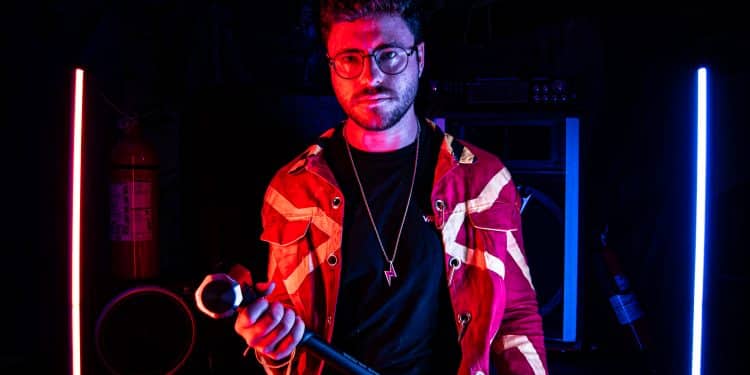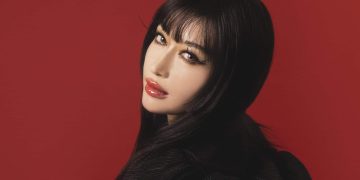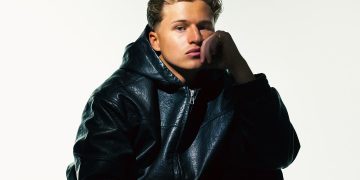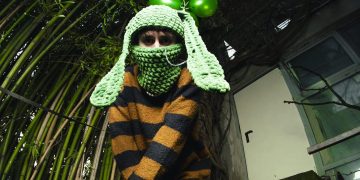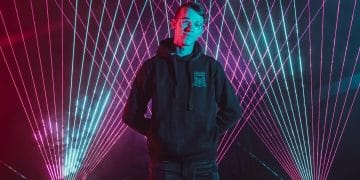We caught up with SIDEPIECE ahead of their WorldPride DC set to discuss their first Pride event and LGBTQ+ culture in dance music.
While Washington, DC was faced with gloomy skies and occasional rain showers on Sunday, June 8, the vibes were high on the final day of WorldPride DC as house music events production group TRIOLOCO took over Hook Hall with their TRÈS CHIC World Pride Tea Dance.
Tea dances were popular places for the LGBTQ+ community to socialize in the ’50s and ’60s. These events hold a significant role in its history as they were one of the only safe spaces for gay individuals to gather and party at the time.
But Pride has always been about more than just the party. At its core, it’s about resistance and resilience, a defiant celebration of identity born out of protest. As LGBTQ+ rights are once again under attack in the current political climate, the TRÉS CHIC Tea Dance held in the nation’s capital served as an important reminder of that legacy.
The daytime party was headlined by Grammy-nominated house duo SIDEPIECE, comprised of Dylan Ragland aka Party Favor and Ricky Mears, known professionally as Nitti Gritti. Their brand and music, famous for its playful and naughty edge, made them a perfect fit for the event as sexuality and positive self-expression are huge parts of Pride. It was also an important moment in SIDEPIECE’s career as it marked their first time ever performing at such an event.
The indoor-outdoor space at Hook Hall was transformed into a nightclub for the occasion, with a disco ball hanging over the crowd of over 500 people. Shirtless men and folks decked out in Pride fashion filled up the venue. It was refreshing to see was how many attendees were facing away from the stage, instead dancing in close circles with their friends and partners.
SIDEPIECE kept the energy high and the dance floor alive with a set full of crowd-pleasing pop anthems like “Gasolina,” “Sweet Dreams,” “Guess,” and “Walking on a Dream.” Blending these familiar hits with their own popular songs like “On My Mind” with Diplo, and “Sextacy” — along with their signature groovy, pulsing house beats — SIDEPIECE delivered a set that amplified the spirit of pride in an unforgettable way.
We caught up with SIDEPIECE right before their set to discuss their thoughts and feelings on playing a Pride event for their first time ever, and the history and intersection between dance music, LGBT+ culture, and rave culture. Read on for the conversation!
Stream SIDEPIECE’s recent single, “Lick,” on Spotify:
First off, welcome back to DC! It’s so great to be talking with you guys today. You’re about to take the stage soon; how are you guys feeling right now?
Dylan Ragland: We feel amazing. It’s our third day of the weekend. Anytime you play a Sunday show you’re always feeling a little loose, but we can tell that the energy’s good. We’re excited.
Ricky Mears: We feel good. Last set of the weekend’s the best, it’s just a fact.
Your set at TRES CHIC today marks your first ever Pride performance. How does it feel to be a part of a celebration with so much meaning behind it, especially in the nation’s capital in today’s political climate?
RM: Yeah, it feels great. Honestly, the best part is that I feel like the LGBTQ+ community really understands house music, so it’s like we’re getting back to our roots. Especially for us as dance music artists, it’s kinda like this crowd has really pushed and moved dance music forward. So we’re grateful for all that. It’s great to be here.
DR: And we’ve had a wonderful queer following since the beginning as well, you know. We’re just grateful. If they want to come see us play, we’re always up for something new.
Dance music, particularly house, has deep roots in the LGBTQ+ community. As artists in this space, how do you honor or stay connected to the culture that helped build the foundation of house music?
RM: Yeah, like I said, it’s mainly through the music, just going back and actually finding the music. We did another interview with someone recently, actually, and we asked him what was a really good song deeply rooted in his old days from the ’90s or ’80s, and we remixed it into a cool house song. We actually just made an edit of it. And even other songs we play are more classic house songs, like Chuck D and stuff, that are rooted in Detroit. It’s a lot of that culture already.
DR: With our music, too, one of the things we love to do is make people have a good time and shake their asses. And I think it doesn’t matter who you are or how you identify, I think everybody wants to do that and just have fun. I think Pride’s also about getting people who don’t have a voice — or communities who don’t have a platform — to be able to feel like they can be themselves. So we’re honored to even be included.
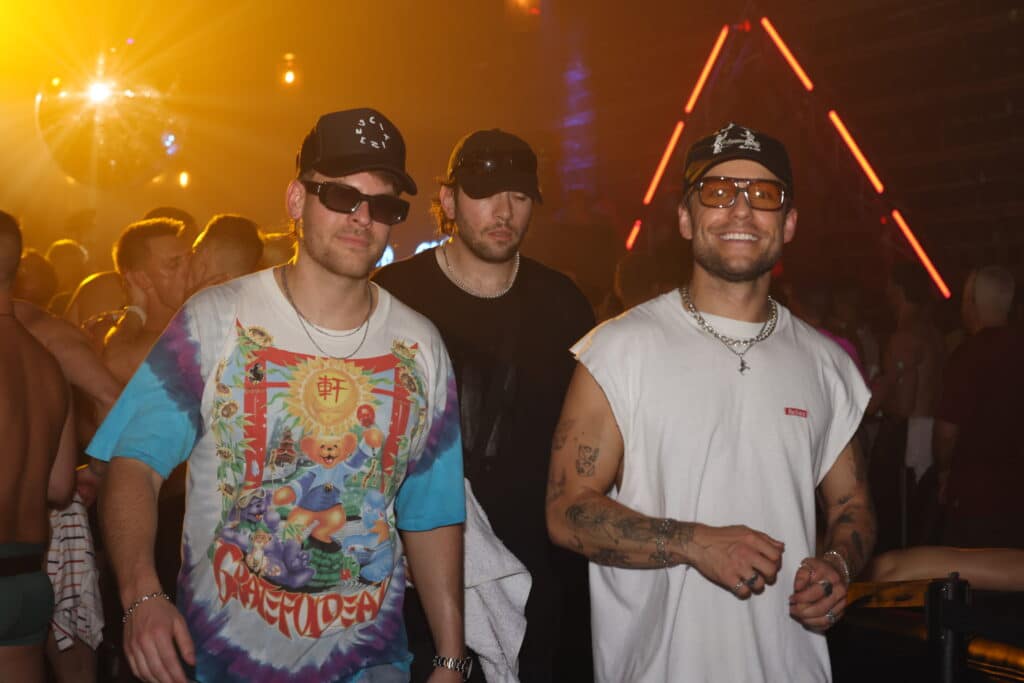
Your music, especially your songs like “Sextacy” and “Sex Sells,” bring a playful and sexy vibe to house music. A huge part of LGBTQ+ culture and Pride is about celebrating sexuality and self-expression. How do you think your music fits into this space?
DR: We have this one song that’s unreleased that’s literally called “Expression.” So we’ve got all the buzzwords and the perfect lyrics for it. Going back to our roots and how we started our name: We started it as a side project, but it was always kind of a tongue-in-cheek, fun thing. It has become this big project, and we’re obviously so excited — it’s our livelihood and lives — but it’s always been rooted in this sense of, like, “Let’s not take ourselves too seriously. Let’s have a good time and enjoy it and take it back to as proper as we can make house music.”
A tea dance is such a historic part of queer nightlife, and in the ’50s and ’60s, it was one of the only safe public spaces for LGBTQ+ folks to gather. How does knowing that history shape how you approach this kind of set compared to your typical sets?
RM: I actually just found that out, so that’s really cool. But to be honest, we already planned our set today and we threw in music that we felt would fit with the queer community, so we’re definitely excited. I love hearing that, though, and learning the history behind it, so that’s very cool. I’m glad you told us that.
DR: Yeah, I think when we get to go play our shows anywhere and everywhere, and we’re normally there, we never have to really think about this stuff, right? We get to go play, we have girls around us. We’re both heterosexual men. But a lot of the time, we forget that there’s this community of people with this history where at one time they had to literally get together in a place — maybe where there’s only one place where they could gather — where they weren’t going to get persecuted or threatened or whatever. So just being able to be a part of this is very cool.
What is the vibe you’re trying to curate with your performance today, and can the crowd expect anything special or unexpected today?
RM: There’s definitely a remix of this record of Pete Heller‘s “Big Love” we’re actually really excited about. It’s about four songs in, and we originally had it at the end of the set, but then we were like, “You know what? Let’s drop it in the beginning.” It feels like it’ll be a fun one to drop. I mean, we could be wrong, but like you said, all our music blends well into the LGBTQ+ community naturally already anyway. So I don’t feel like we’re changing much about ourselves. We kind of want to be true to ourselves, and we’re just glad that the community has accepted our music and enjoys it. So we try to be ourselves, and it’s not to far out of our lane anyways.
DR: It’s like we’re gonna play our set how we normally do, and try to add a little flair here and there.
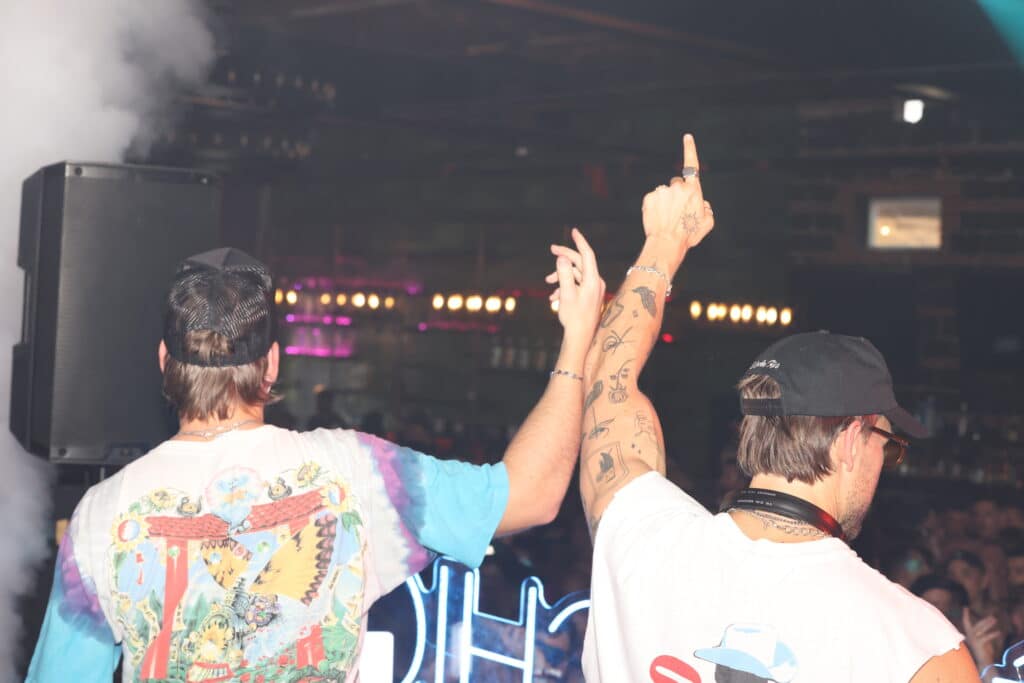
You guys have played some massive stages in your careers, including yesterday’s performance at Beyond Wonderland Chicago and an appearance at EDC Las Vegas last month. But today’s show in Hook Hall is to a much smaller crowd in a more intimate setting. Is there anything you find special or particularly enjoyable about these kinds of shows?
RM: We’ve done a lot of shows this year before the summer at medium-smaller venues, and we honestly get most of our inspiration from playing smaller venues like this. And we take that inspiration, we go to the big festivals and we play something we made. But the last few shows where we’ve had really fun, intimate crowds — we just get inspired by playing a longer, deeper set, and then that inspires new music and we get really excited. And the last three days, we’ve both been finishing brand new music, edits, remixes, and originals. Tonight, we’re probably about to play three new songs from this weekend because we had a few cool shows to prepare for.
DR: There’s no better place to test new music and try new things than in an intimate setting, because you really get to see the reaction, and feel it too. I don’t know how else to describe it, but I personally always prefer the smaller clubs.
Pride and rave culture are all about celebration today, but both share roots in resistance. What do you think dance music brings to Pride that goes beyond the party?
DR: On the basis of, let’s say, PLUR culture, I think that that community as a whole has always been about accepting everybody. Peace, love, unity, respect — everybody’s welcome under this tent, right? And I think that how we interpret it with Pride, it’s kind of the same thing. It’s like here’s your way to come and be yourself without fear of anything else. And I think those two go hand in hand. It’s essentially two sides of the same coin.
RM: Dance music is just one of those styles of music that keeps undergoing a lot of construction and has had to be built up. I don’t want to make an exact comparison, but similarly rave culture was looked down upon and banned and had to be shunned into warehouses for many years. It’s a similar story for the whole community. I like punk rock and stuff, where they’re against the government and talking about similar things. This type of music has a very similar trajectory, so that’s very cool.
Finally, is there any message you’re hoping to convey with your set today, and what do you hope the crowd feels leaving your set today?
RM: Happy, supported.
DR: Hopefully they shake their ass the whole time. Enjoy, dance. We expect that of every set.
RM: Yeah, they’re here to dance. We don’t ask for much.
Follow SIDEPIECE:
Website | Facebook | X | Instagram | SoundCloud | YouTube | TikTok



